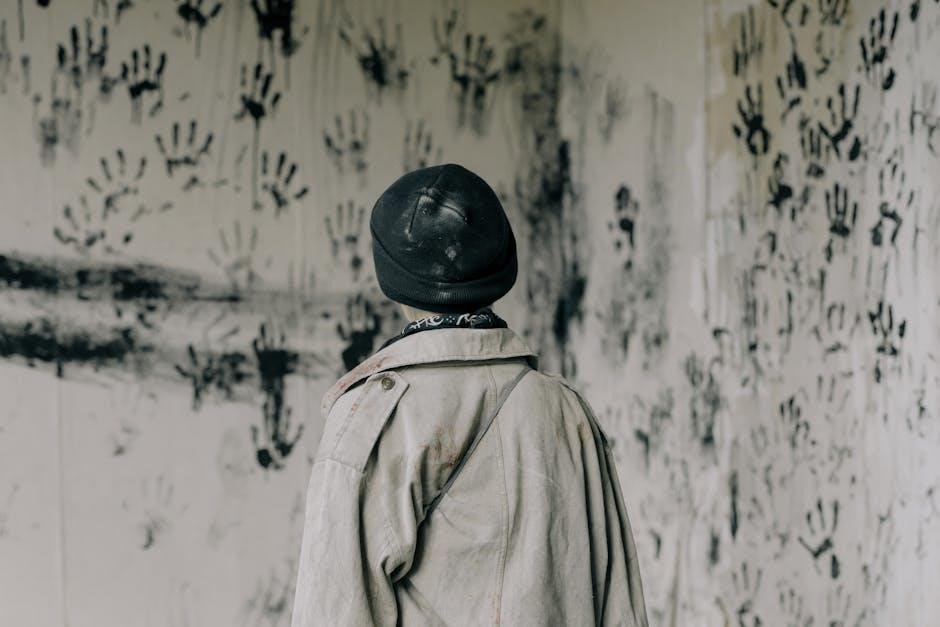Ruined by Lynn Nottage is a powerful play set in the Democratic Republic of the Congo, exploring themes of survival, resilience, and the impact of war on women. The PDF version of the play is widely sought after for its accessibility and profound storytelling, making it a crucial resource for scholars and readers worldwide.
1.1 Background of the Play
Ruined, written by Pulitzer Prize-winning playwright Lynn Nottage, is a poignant drama set in the Democratic Republic of the Congo during a time of civil war. The play revolves around Mama Nadi, the proprietor of a brothel, and the women who seek refuge there. Drawing inspiration from real-life stories of women affected by conflict in Africa, Nottage crafted a narrative that explores themes of survival, resilience, and the devastating impact of war on women. The play delves into the complexities of human endurance, economic exploitation, and the struggle for hope amidst chaos. Its powerful storytelling and vivid characters have made it a significant work in contemporary theatre, shedding light on the untold stories of women in war-torn regions.
1.2 Importance of the PDF Version
The PDF version of Ruined by Lynn Nottage has gained significant popularity due to its accessibility and convenience. It allows readers to easily access the play’s powerful narrative, exploring themes of survival and resilience, without the need for physical copies. The digital format has made the play widely available, enabling students, scholars, and theater enthusiasts to study and appreciate Nottage’s work globally. Additionally, the PDF version often includes annotations, study guides, and critical analyses, enhancing the reader’s understanding of the play’s deeper themes and cultural context. Its portability and readability on various devices have further cemented its importance as a vital resource for exploring Nottage’s impactful storytelling.
Historical and Cultural Context
The play is set in the Democratic Republic of the Congo, reflecting the region’s turbulent history and the devastating impact of war on its people, particularly women.
2.1 Setting in the Democratic Republic of the Congo
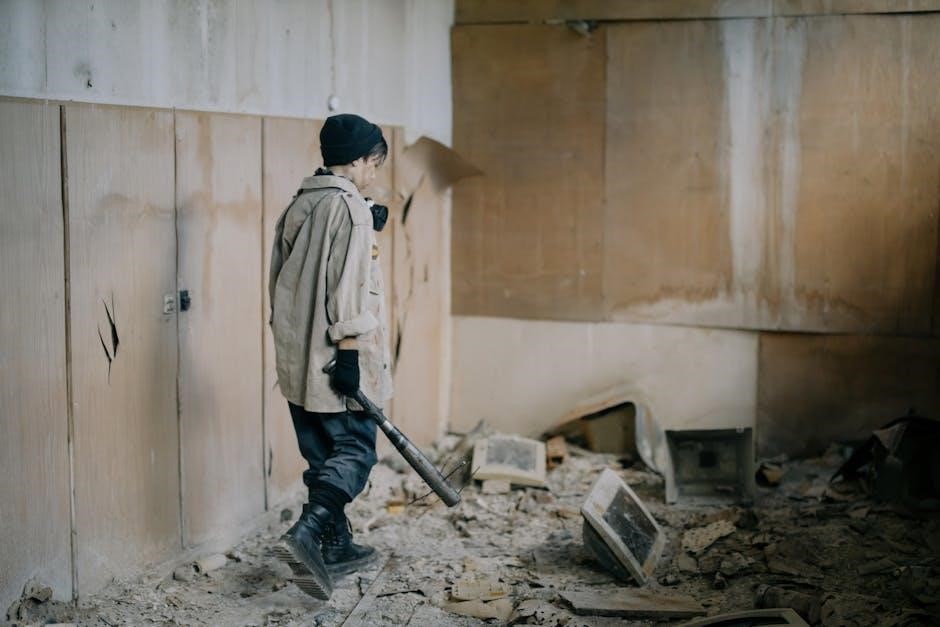
The play Ruined is set in the Democratic Republic of the Congo during a time of civil war and unrest. The story unfolds in a small mining village, where the characters navigate the harsh realities of conflict and exploitation. Mama Nadi’s bar serves as a refuge for women and a hub for trade, reflecting the blending of survival and commerce in a war-torn society. The setting highlights the devastating impact of war on local communities, particularly women, while also showcasing their resilience. The Congo’s tumultuous environment shapes the characters’ lives, creating a backdrop of violence, displacement, and economic struggle that underscores the play’s themes of survival and exploitation.
2.2 Impact of War on Women in the DRC
The Democratic Republic of the Congo has endured decades of conflict, leading to devastating consequences for women. Sexual violence, displacement, and economic exploitation are pervasive, as depicted in Ruined. Women often bear the brunt of war, facing unimaginable horrors that disrupt their lives and communities. The play highlights their resilience, as they navigate survival amidst chaos. The PDF version of Ruined sheds light on these atrocities, offering a poignant portrayal of women’s struggles and their efforts to rebuild lives shattered by war. Lynn Nottage’s work underscores the urgent need for global awareness and action to protect women in conflict zones, making the PDF a vital resource for understanding their plight.

Themes
The play explores survival, resilience, and the devastating impact of war on women, highlighting economic exploitation and the struggle for hope amidst chaos and destruction.
3.1 Survival and Resilience
In Ruined, survival and resilience are central themes, vividly portrayed through the characters’ struggles in a war-torn Democratic Republic of the Congo. Mama Nadi, the brothel owner, embodies survival by navigating the harsh realities of conflict, protecting her business, and providing refuge for women. Salima, a young woman brutalized by soldiers, exemplifies resilience as she confronts her trauma and rebuilds her life. The play highlights how women adapt to unimaginable circumstances, finding strength in solidarity and resourcefulness. Nottage’s portrayal underscores the human spirit’s capacity to endure, even in the face of extreme adversity, offering a powerful exploration of survival and resilience in the midst of war and societal collapse.
3.2 The Impact of War on Women
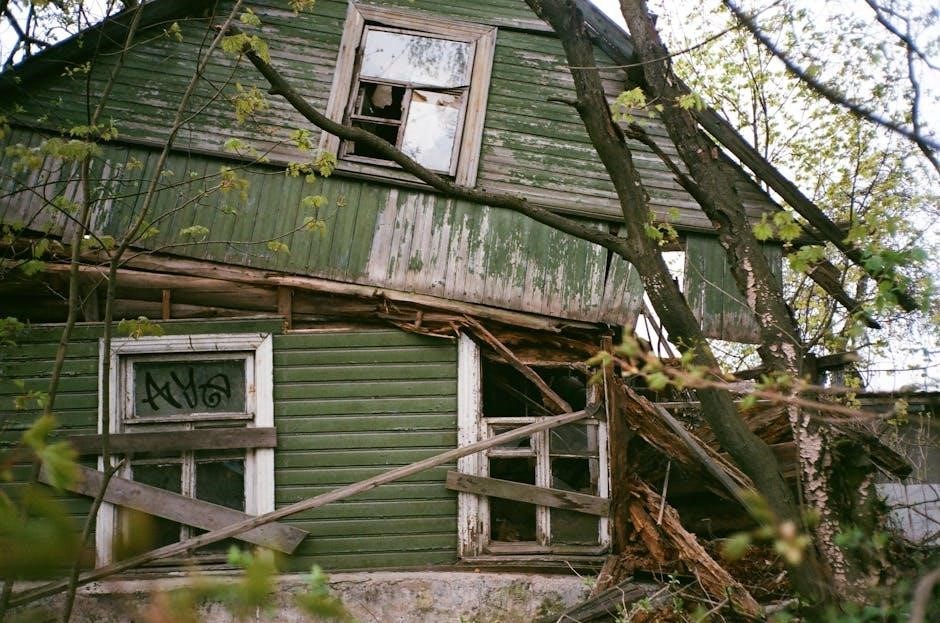
In Ruined, Lynn Nottage vividly portrays the devastating effects of war on women in the Democratic Republic of the Congo. The play highlights the physical and emotional trauma experienced by women, including sexual violence, displacement, and exploitation. Characters like Salima and Mama Nadi embody the resilience and survival strategies of women in conflict zones, yet their stories also reveal the deep scars left by war. The PDF version of the play amplifies these themes, offering readers a direct engagement with the raw emotions and harsh realities depicted. Nottage’s work underscores the humanity of women often reduced to statistics, making Ruined a poignant exploration of gender, conflict, and survival.
3.3 Economic Exploitation
In Ruined, Lynn Nottage vividly portrays economic exploitation as a pervasive reality in war-torn Democratic Republic of the Congo. Mama Nadi’s brothel serves as a microcosm of systemic exploitation, where women’s bodies are commodified to survive. The play highlights how war disrupts local economies, forcing individuals into precarious livelihoods. Women, in particular, face dual exploitation: their labor in mining and agriculture is stolen, while their bodies are traded for survival. Nottage critiques the global economic systems that perpetuate inequality, as resources are extracted while locals remain impoverished. Through Mama Nadi’s fierce negotiations and the women’s resilience, the play underscores the intersections of survival, resistance, and economic oppression, revealing how war profiteering exacerbates human suffering. This theme resonates deeply, offering a stark commentary on the exploitation of marginalized communities in conflict zones.
3.4 Hope and Redemption
In Ruined, Lynn Nottage intertwines themes of hope and redemption amidst the devastation of war. While the play portrays the brutal realities faced by women, it also highlights their resilience and capacity for renewal. Mama Nadi, the brothel owner, embodies this duality, offering a fragile sense of safety and hope to the women under her care. Through their stories, Nottage suggests that even in the darkest times, there is a possibility for healing and redemption. The play does not shy away from the horrors of war but balances them with moments of humanity and hope, leaving audiences with a profound sense of the strength of the human spirit.
Characters
The play revolves around strong, complex characters like Mama Nadi, the brothel owner, and Salima, a traumatized victim of war, showcasing their resilience and struggles amidst conflict.
4.1 Mama Nadi
Mama Nadi is the formidable owner of a brothel in the Democratic Republic of the Congo, portrayed as a complex and multifaceted character in Ruined. She embodies both strength and vulnerability, navigating the harsh realities of war while maintaining a sanctuary for women. Her pragmatic approach to survival is evident in her strict rules and tough exterior, which often mask a deep understanding of the women’s plight. Mama Nadi’s character serves as a symbol of resilience and resourcefulness, highlighting the ways women adapt to survive in conflict zones; Her relationships with the women, particularly Salima, reveal a protective yet guarded nature, emphasizing the moral compromises she makes to sustain her business and protect those under her care.
4.2 Salima
Salima is a central character in Ruined, portrayed as a young woman deeply scarred by the atrocities of war. Her presence in Mama Nadi’s brothel highlights the brutal realities faced by women in conflict zones. Salima’s story is one of resilience and silent strength, as she navigates the physical and emotional wounds inflicted by her captors. Through her character, Nottage underscores the long-lasting psychological trauma experienced by women in war-torn regions. Salima’s relationships with Mama Nadi and other characters reveal complex dynamics, blending dependency and tension. Her journey in the play serves as a poignant reminder of the human cost of conflict and the struggle for survival in a shattered world.
4.3 Other Key Characters
Josephine, a strong-willed and ambitious prostitute, plays a pivotal role in the dynamics of Mama Nadi’s brothel. Sophie, a young and traumatized woman, embodies the devastating effects of war on women. Christian, a local trader, serves as a link to the outside world, bringing supplies and news. Each character contributes uniquely to the play’s exploration of survival, resilience, and exploitation. Their interactions reveal the complexities of human relationships in a war-torn environment. These characters, along with others, enrich the narrative, providing deeper insights into the societal and emotional struggles portrayed in Ruined. Their stories highlight the broader implications of conflict on individuals and communities, making the play a powerful commentary on human endurance and hope.
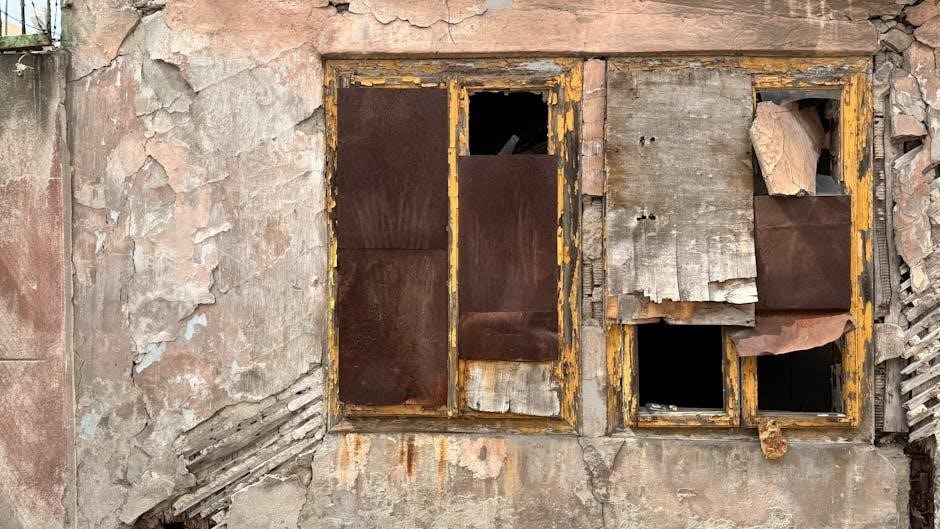
Plot Overview
Ruined by Lynn Nottage revolves around Mama Nadi, a brothel owner in the Democratic Republic of the Congo, and the women struggling to survive amidst war and exploitation.
5.1 Summary of the Play
Ruined, written by Lynn Nottage, is a poignant drama set in the Democratic Republic of the Congo during a time of civil war. The story revolves around Mama Nadi, the proprietor of a local bar and brothel, who provides refuge to women affected by the conflict. Central characters like Salima, a young woman brutalized by soldiers, and Sophie, a traumatized teenager, illustrate the devastating impact of war on women. The play explores themes of survival, resilience, and exploitation, offering a harrowing yet hopeful portrayal of life amidst chaos. Through its vivid characters and unflinching narrative, Ruined sheds light on the human cost of war and the strength of women in the face of unimaginable adversity.
5.2 Key Scenes and Events
The play Ruined unfolds in a brothel in the Democratic Republic of the Congo, owned by Mama Nadi. Key scenes include the arrival of Salima, a young woman escaping war, and the tension between her and the other women. The brothel serves as a refuge and a battlefield, with moments of raw emotion and resilience. A pivotal scene involves Mama Nadi’s confrontation with Christian, a miner, highlighting her complex role as protector and businesswoman. The play also depicts the brutal reality of war through the interactions of rebel fighters and government soldiers. Musical elements weave through the narrative, adding depth to the characters’ struggles and hopes. These scenes collectively portray the devastating impact of conflict and the women’s fight for survival and dignity.
5.3 Climax and Resolution
The climax of Ruined occurs when Salima confronts her husband, Christian, about their child, forcing him to acknowledge the atrocities of war. This emotional peak underscores the play’s themes of survival and resilience. The resolution brings a sense of hope, as the women begin to rebuild their lives, symbolizing their strength amid devastation. Mama Nadi’s brothel, though flawed, becomes a refuge, highlighting the complexity of their existence. The play ends on a note of enduring hope, leaving the audience with a profound reflection on humanity’s capacity for resilience and redemption.

Playwright: Lynn Nottage
Lynn Nottage is a Pulitzer Prize-winning playwright known for her powerful, poignant works exploring marginalized communities. Her play Ruined reflects her commitment to storytelling and activism.
6.1 Biography and Background
Lynn Nottage, born in 1964 in Brooklyn, New York, is a Pulitzer Prize-winning playwright renowned for her powerful portrayals of marginalized communities. She holds a degree in theatre from Brown University and an MFA from Yale School of Drama. Nottage’s work often explores themes of social justice, feminism, and the African diaspora. Her plays, such as Ruined, reflect her deep commitment to storytelling that amplifies the voices of the oppressed. Drawing inspiration from her research with women affected by war in Africa, Nottage crafted Ruined to highlight the resilience and struggles of women in the Democratic Republic of the Congo; Her work has earned her critical acclaim and numerous awards, solidifying her legacy as a leading voice in contemporary theatre.
6.2 Her Style and Influences
Lynn Nottage’s style in Ruined blends gritty realism with poetic expression, creating a raw yet deeply emotional narrative. Her work is influenced by her research with women affected by war in Africa, as well as her commitment to social activism. Nottage’s ability to craft complex, nuanced female characters, such as Mama Nadi and Salima, underscores her dedication to amplifying marginalized voices. Her writing often combines drama with political commentary, making her a pivotal figure in contemporary theatre. Drawing from her exploration of themes like survival, resilience, and exploitation, Nottage’s unique voice has resonated globally, inspiring conversations about human rights and gender inequality.
6.3 Major Works and Awards
Lynn Nottage is celebrated for her impactful plays that address social and political issues. Her major works include Sweat, Intimate Apparel, and Ruined, which earned her the Pulitzer Prize for Drama in 2009. This acclaim solidified her reputation as a leading voice in contemporary theatre. Her ability to craft compelling narratives about marginalized communities has garnered widespread recognition. Nottage’s work continues to resonate globally, making her one of the most respected playwrights of her generation. The PDF version of Ruined remains a vital resource for studying her mastery of storytelling and social commentary.
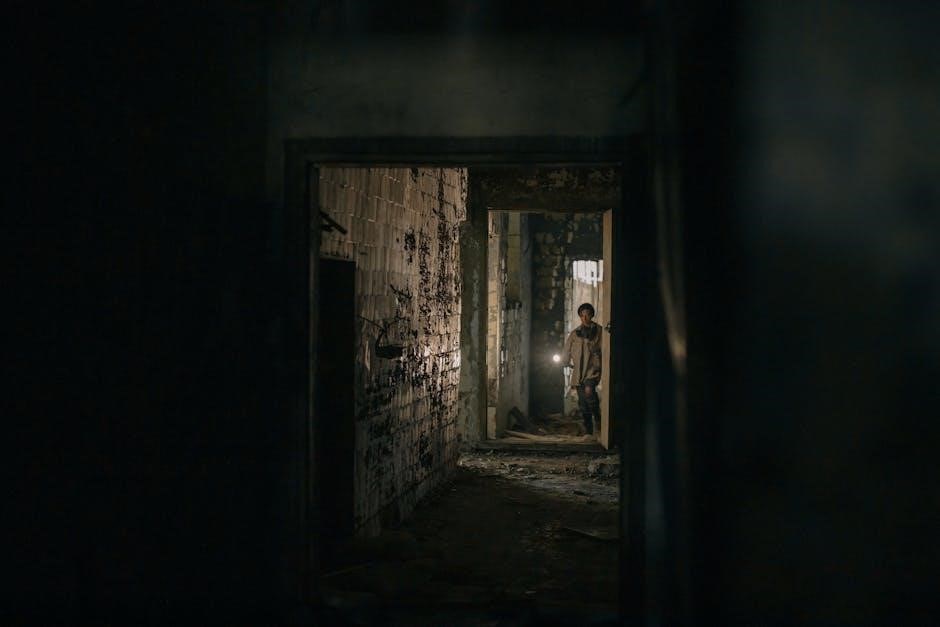
Reception and Awards
Ruined won the 2009 Pulitzer Prize for Drama, earning critical acclaim for its powerful portrayal of war’s impact on women, resonating deeply with audiences worldwide.
7.1 Pulitzer Prize Win
Ruined by Lynn Nottage won the Pulitzer Prize for Drama in 2009, a landmark achievement that highlighted its profound impact and artistic excellence. The play was recognized for its unflinching portrayal of the lives of Congolese women during wartime, blending raw emotion with poetic storytelling. This accolade not only elevated Nottage’s status as a leading playwright but also brought global attention to the harsh realities depicted in the play. The Pulitzer win significantly boosted the demand for the PDF version of Ruined, making it a widely accessed resource for educational and theatrical purposes. The award underscored the play’s ability to resonate with audiences and spark critical conversations about social justice and human resilience.
7.2 Critical Reception
Ruined by Lynn Nottage received widespread critical acclaim for its raw portrayal of war’s impact on women in the Democratic Republic of the Congo. Critics praised the play’s emotional depth, strong characterization, and nuanced dialogue. The PDF version has been particularly noted for its accessibility, allowing readers to engage deeply with the themes of survival and resilience. Many reviewers highlighted Nottage’s ability to balance storytelling with social commentary, making the play both poignant and thought-provoking. The character of Mama Nadi, in particular, has been celebrated for her complexity and moral ambiguity. The play’s success lies in its unflinching examination of human suffering, which resonates powerfully in both theatrical productions and written form, solidifying its place in contemporary drama.
7.3 Audience Response
The audience response to Ruined has been overwhelmingly positive, with many praising its emotional depth and powerful portrayal of women’s resilience. The play’s ability to balance harrowing truths with moments of hope resonates deeply, creating a lasting impact. The availability of the PDF version has further amplified its reach, allowing global readers to engage with Nottage’s work. Many have highlighted the play’s relevance in sparking conversations about gender, war, and survival. The emotional connection audiences feel with characters like Mama Nadi and Salima underscores the play’s universal appeal. This widespread acclaim reflects the importance of Ruined as a contemporary masterpiece in theater.
PDF Availability and Sources
The PDF version of Ruined by Lynn Nottage is available on platforms like Scribd and educational websites, offering easy access for readers and scholars worldwide.
8.1 Where to Find the PDF
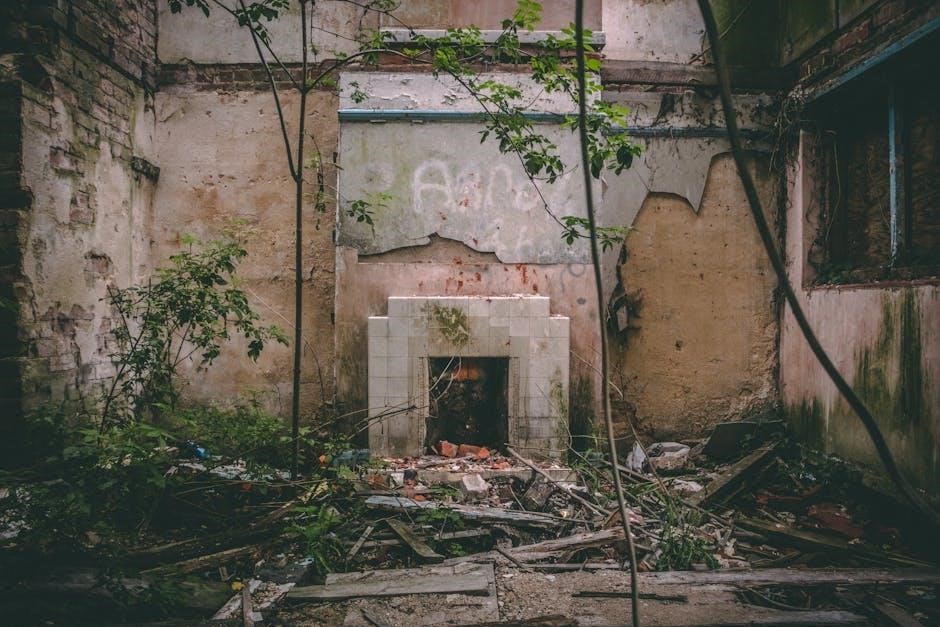
The PDF version of Ruined by Lynn Nottage can be found on various online platforms. Popular sources include Scribd, Google Books, and Amazon, where it is available for purchase or free download. Academic databases like JSTOR and university libraries also offer access. Additionally, websites specializing in play scripts and literary works often host the PDF. Some platforms may require a subscription or payment, while others provide it for free. Searching with terms like “Ruined Lynn Nottage PDF free” or “Ruined play PDF download” can yield results. Always ensure to use reputable sources to avoid unauthorized or unsafe downloads.
8.2 Popularity of the PDF Version
The PDF version of Ruined by Lynn Nottage has gained significant popularity due to its accessibility and widespread availability online. Many platforms, such as Scribd and academic databases, offer free or paid downloads, making it easier for readers to access the play. The PDF format is particularly favored for its convenience, allowing users to read the play on various devices. Its popularity is further driven by the play’s critical acclaim and educational value, as it is frequently studied in literature and drama courses. The demand for the PDF underscores the enduring relevance of Nottage’s work in exploring themes of survival and resilience in war-torn regions. This digital version has become a vital resource for both casual readers and scholars.
8.3 Associated Study Guides
Several study guides complement the Ruined PDF, offering in-depth analyses of its themes, characters, and historical context. These guides are widely available online and through academic platforms, providing readers with tools to better understand the play’s complexities. Many focus on the feminist perspectives and political commentary woven into the narrative, while others explore the cultural significance of the Democratic Republic of the Congo setting. Additionally, some guides include essays and discussions on Lynn Nottage’s writing style and her use of symbolism. These resources are particularly valuable for students and scholars seeking to delve deeper into the play’s meaning and relevance. They often feature summaries, character analyses, and critical insights, making them indispensable for academic exploration.

Analysis and Interpretation
Ruined offers a profound exploration of war’s devastating effects, highlighting women’s resilience and survival. Mama Nadi’s brothel serves as a refuge, symbolizing hope amid chaos, while the PDF version enhances accessibility for deeper analysis.
9.1 Symbolism in the Play
In Ruined, Lynn Nottage employs powerful symbolism to convey the devastating impact of war. Mama Nadi’s bar serves as a sanctuary and a brothel, symbolizing both survival and exploitation. The rainforest setting represents a world torn apart, where nature is disrupted by human conflict. Mama Nadi herself embodies resilience and moral ambiguity, while the women’s bodies symbolize the cost of war. Music and dance are used to mask pain and maintain hope, highlighting the duality of life amidst chaos. These symbols collectively underscore the play’s themes of survival, exploitation, and the enduring human spirit.
9.2 Feminist Perspectives
Ruined offers a powerful feminist lens, highlighting the resilience and agency of women in war-torn Congo. Mama Nadi, the protagonist, embodies both strength and vulnerability, challenging patriarchal norms. The play critiques the exploitation of women’s bodies and explores their survival strategies, emphasizing their humanity amidst chaos. Through characters like Salima, Nottage underscores the long-term psychological and physical scars of sexual violence. The feminist perspective in Ruined not only sheds light on gender-based violence but also celebrates women’s solidarity and resistance. This makes the PDF version of the play a vital resource for feminist studies, offering deep insights into the intersection of gender, war, and survival.
9.3 Political Commentary
In Ruined, Lynn Nottage delivers a searing political commentary on the exploitation and oppression of marginalized communities, particularly women, in war-torn regions. The play critiques systemic injustices, highlighting how political instability and corruption exacerbate human suffering. Through Mama Nadi’s brothel, Nottage examines the commodification of women’s bodies and the moral ambiguity of survival under oppressive regimes. The PDF version of the play amplifies these themes, offering readers a direct lens into the harsh realities of conflict and exploitation. Nottage’s work challenges audiences to confront the global indifference to such atrocities, making Ruined a powerful tool for political and social discourse.
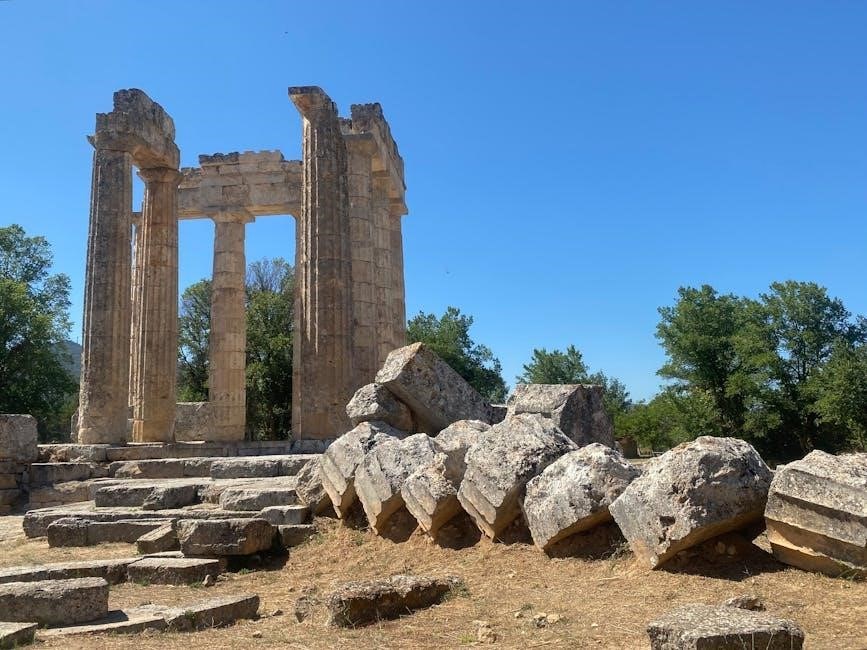
Stage Adaptations and Productions
Ruined has been staged in notable productions worldwide, including its commission by The Goodman Theatre, with Kimberly Osgood as stage manager, showcasing its powerful storytelling and impact.
10.1 Notable Productions
Ruined has been staged in numerous notable productions worldwide, with its world premiere at the Goodman Theatre in Chicago in 2008. The play later moved to Off-Broadway at the New York City Center, earning critical acclaim. International productions have further highlighted its universal resonance, with performances in London and other global cities. Directed by Kate Whoriskey, the original production featured a powerful cast that brought depth to the characters. The play’s success has been marked by its ability to evoke emotional responses and spark conversations about its themes. Its production history underscores its impact as a significant work in contemporary theatre, continuing to attract audiences and inspire new stagings.
